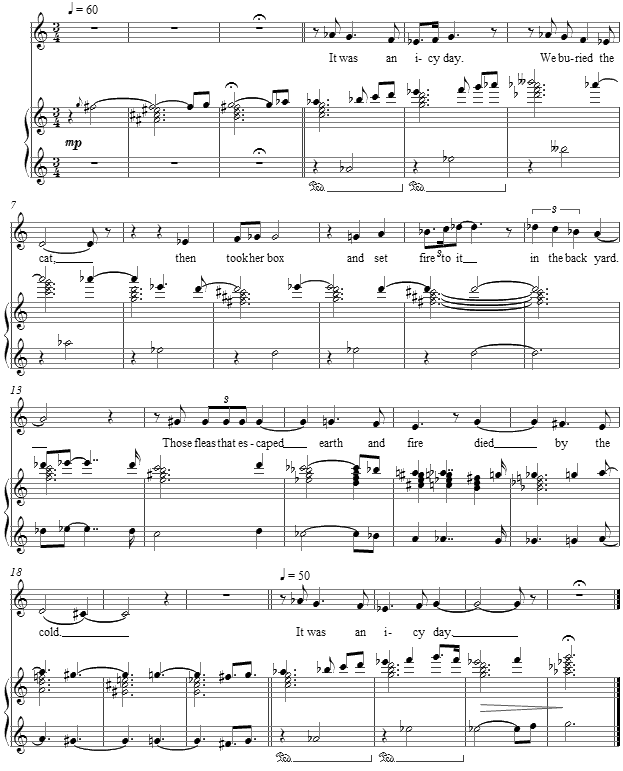Music and Texts of GARY BACHLUND
Vocal Music | Piano | Organ | Chamber Music | Orchestral | Articles and Commentary | Poems and Stories | Miscellany | FAQs
Complete Destruction - (2008)
William Carlos Williams
for medium voice and piano
It was an icy day.
We buried the cat,
then took her box
and set fire to it
in the back yard.
Those fleas that escaped
earth and fire
died by the cold.Original text: William Carlos Williams, Sour Grapes: a Book of Poems (Boston: The Four Seas Company, 1921)
[ 1 page, circa 1' 10" ]
William Carlos Williams
William Carlos Williams was a physician in Rutherford, New Jersey, from 1910 to 1951, and in hours after work wrote fiction, poetry, plays, and criticism. He studied medicine at the University of Pennsylvania (1902-06), and there met Ezra Pound and Hilda Doolittle. He interned at the French Hospital and Nursery and Child's Hospital until 1909, and the next year, after studying briefly in Leipzig, touring Europe, and visiting his old friend Pound in London, set up his private medical practice in Rutherford. Williams established himself as a modernist poet with four books of verse, Al Que Quiere! (1917), Kora in Hell (1920), Sour Grapes (1921), and Spring and All (1921). His poetry was not initially well received; for this he wrote fiction and plays, but the major work of his life proved to be Paterson, an epic poem published in five volumes from 1946 to 1958. In 1950 Williams was elected to the National Institute of Arts and Letters, and in 1953 shared the Bollingen Award with Archibald MacLeish. All his life, from his early editing of Contact in 1923, Williams befriended younger poets. He was posthumously awarded the Pulitzer Prize and the Gold Medal for Poetry of the National Institute of Arts and Letters.
This strange, short poem is something akin to haiku, on the one hand, and a unrhymed free verse vignette. Odd as the subject matter is, the text struck me for its terse examination of such minutiae as a dead cat's fleas. For this the setting is a short minute in length, brittle in its use of the higher range of the piano, and dark for its emphasis on the added minor six for each accompanying triad. The sagging and slipping chromaticism frustrates the sense of a clearly voiced tonality and yet the setting is darkly consonant.
The score for Complete Destruction is available as a free PDF download, though any major commercial performance or recording of the work is prohibited without prior arrangement with the composer. Click on the graphic below for this piano-vocal score.

